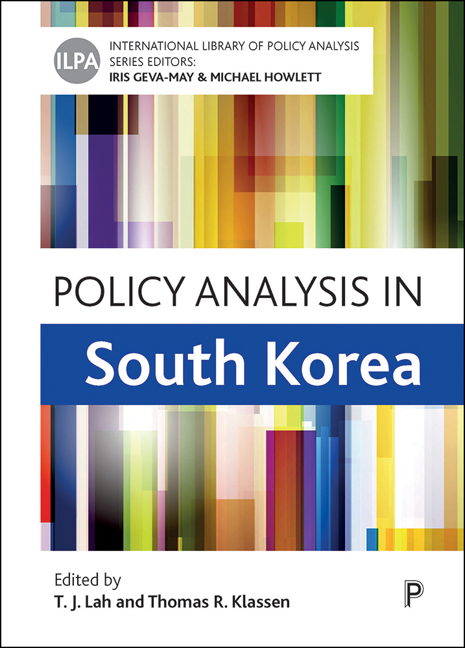Book contents
- Frontmatter
- Dedication
- Contents
- List of figures, tables and boxes
- List of abbreviations
- Notes on contributors
- Acknowledgements
- Editors’ introduction to the series
- Foreword
- Part One Overview of policy analysis in Korea
- Part Two Policy analysis by governments
- Part Three Committees, consultants, media, public inquiries and public opinion
- Part Four Parties, interest groups and advocacy-based policy analysis
- Part Five Academia, research institutes and policy analysis
- Index
thirteen - Business associations and policy analysis
Published online by Cambridge University Press: 18 January 2024
- Frontmatter
- Dedication
- Contents
- List of figures, tables and boxes
- List of abbreviations
- Notes on contributors
- Acknowledgements
- Editors’ introduction to the series
- Foreword
- Part One Overview of policy analysis in Korea
- Part Two Policy analysis by governments
- Part Three Committees, consultants, media, public inquiries and public opinion
- Part Four Parties, interest groups and advocacy-based policy analysis
- Part Five Academia, research institutes and policy analysis
- Index
Summary
Introduction
This chapter explains the growth and influence of business associations on policy analysis in Korea through institutional analysis of business associations and an examination of specific policy examples. The analysis focuses on three kinds of business associations. The first is business associations from conglomerates, or chaebols. Since economic development in Korea traditionally depended upon these enterprises, they created their own business associations, which have grown into influential players in the policymaking process. This category includes the Federation of Korean Industries (FKI) and Korea Employer's Federation (KEF). By utilising financial resources donated by member companies, the FKI created its own think tank to provide analysis on policy issues associated with the interests of conglomerates. The second is business associations that represent small and medium-sized enterprises (SMEs). The biggest of these is the Korea Federation of SMEs (KBIZ). These organisations have been empowered by policy changes that sought to support SMES in order to remedy Korea's excessive dependence on chaebols. The third is business associations from specific industries.
The second part of this chapter discusses policy cases that demonstrate the involvement of business associations in the policy process on issues including the minimum wage, working hours and corporate tax.
Overview of business associations
Business associations in Korea exist under Article 32 of the Civil Act (Incorporation of Non-profit-making Juristic Person and Permission thereof). Entities that represent micro enterprises, SMEs and HPEs fall under the Cooperatives Act or a number of Special Acts. In this section, we investigate five entities: The Federation of Korean Industries (FKI), Korea Federation of SMEs (KBIZ), Korea Employer's Federation (KEF), Federation of Middle Market Enterprises of Korea (FOMEK), and Korea Federation of Micro Enterprises (KFME). These are summarised in Table 13.1.
The FKI and KBIZ were established in line with the government's intention to receive advice from industry on economic development. The FKI represents conglomerates, while KBIZ represents SMEs. The FKI and KBIZ have put forward policy suggestions and voluntarily agreed to regulations at the request of the government or their members. When labour disputes heated up in the 1970s with the growth of the Confederation of Trade Unions (CTU), the KEF was established by the FKI to deal with labour issues.
Conglomerates and SMEs have grown rapidly over the years with government support, and this growth is commonly referred to as the ‘Miracle of Han River’ (1961– 97).
- Type
- Chapter
- Information
- Policy Analysis in South Korea , pp. 193 - 210Publisher: Bristol University PressPrint publication year: 2023



